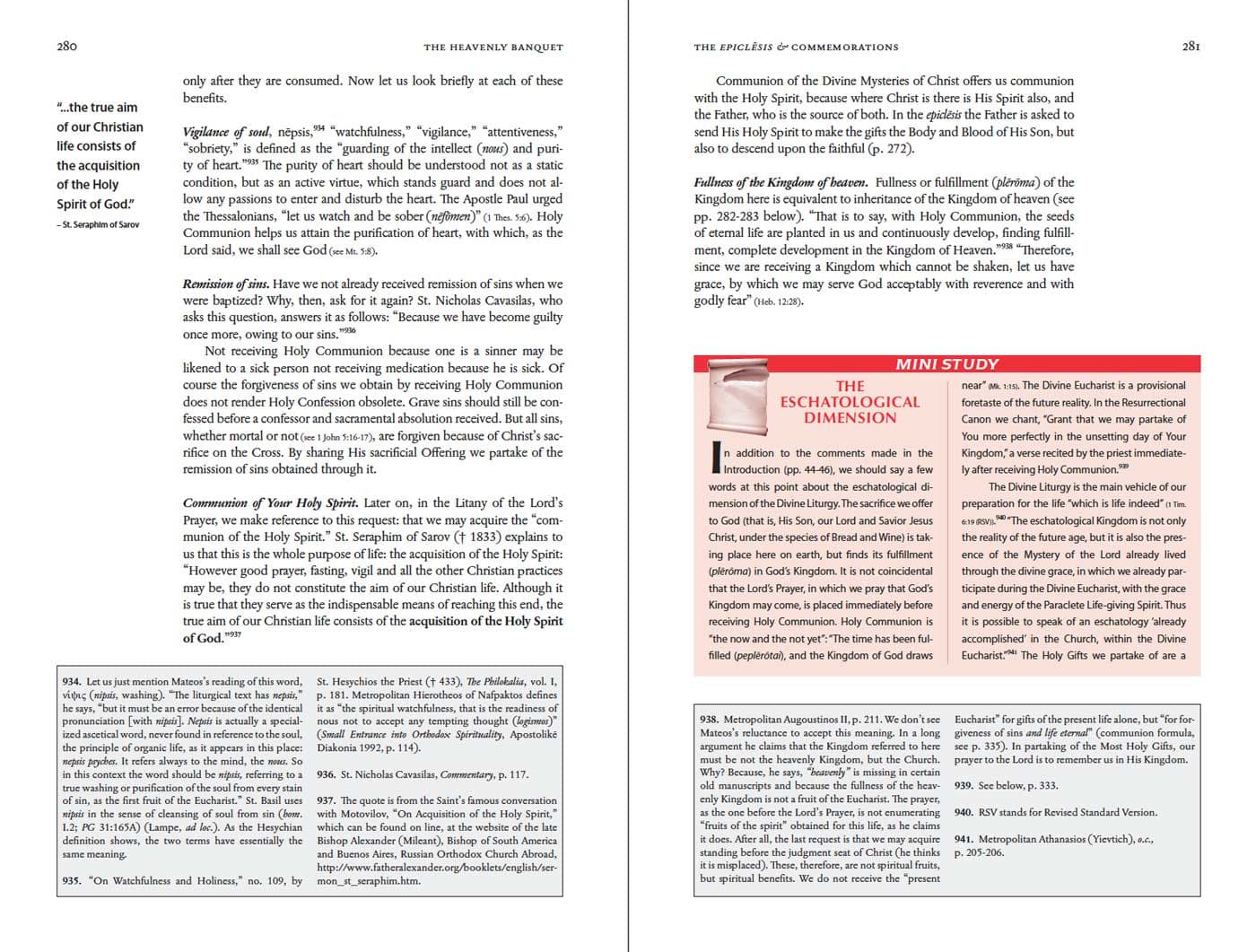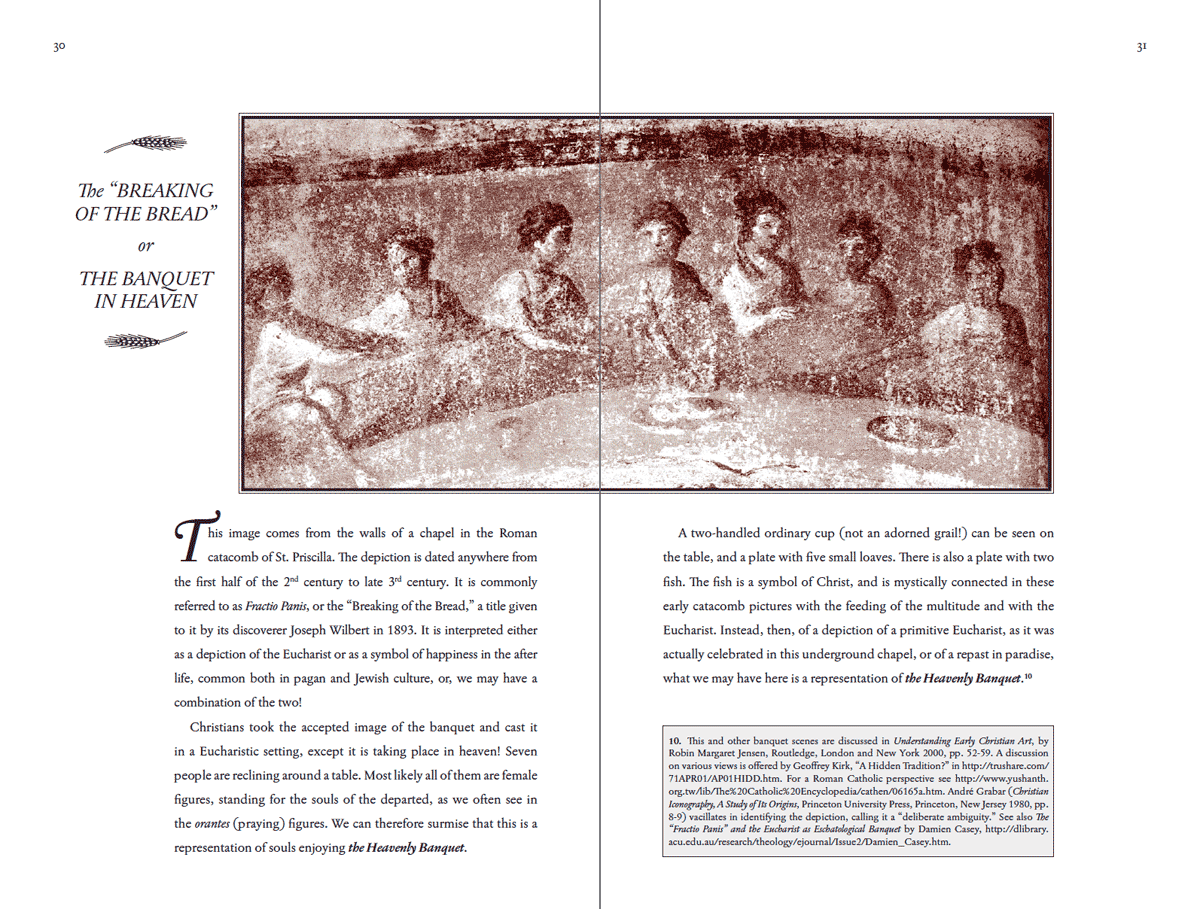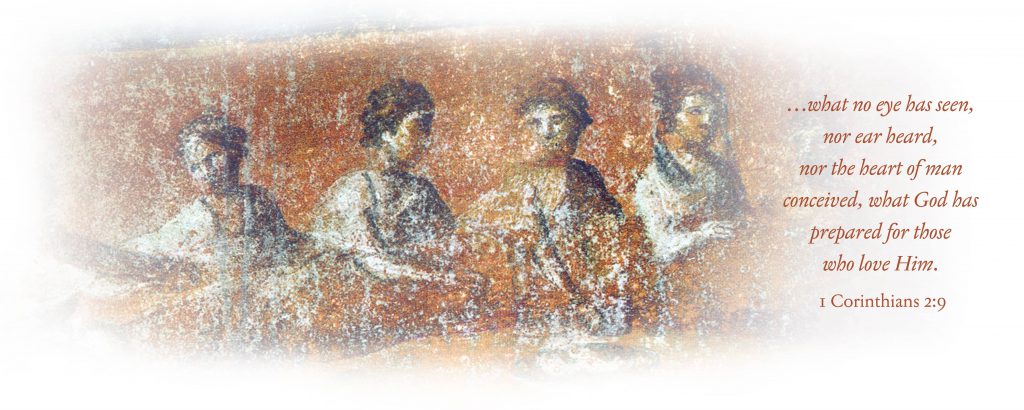
You are invited to the Heavenly Banquet
Fr. Chris: A unique new commentary on the Divine Liturgy is now available from Orthodox Witness. The Heavenly Banquet: Understanding the Divine Liturgy, by Fr. Emmanuel Hatzidakis, was written for all inquiring worshippers. In his Foreword to The Heavenly Banquet, Archbishop Nathaniel says, “No longer will anyone say, ‘I get nothing out of the Liturgy.’” We have with us today Fr. Emmanuel Hatzidakis, to tell us about his new book and why you will want to read it!
Hello, Fr. Emmanuel. Thank you for this interview.
Fr. Emmanuel: Thank you, Fr. Chris, for having me.
Fr. C: There are already a number of books on the Divine Liturgy. What's so unique about yours?
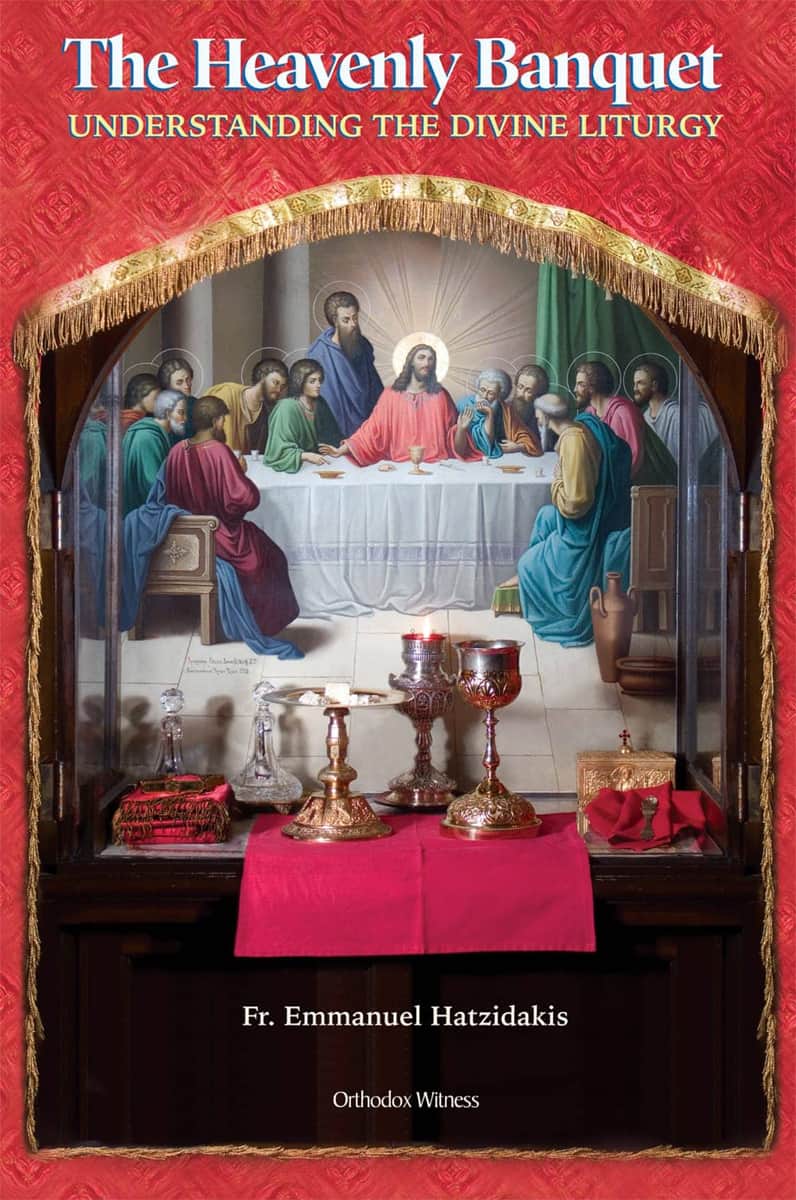
Fr. E: To be sure, there are a number of liturgical commentaries written on the subject, both ancient and modern (I refer to all of them in the very first notes of the book). I drew from all of these sources, utilizing what I thought was of interest to our contemporary readership, acknowledging them in appropriate citations. Information was also drawn from many small articles, in print or in electronic form, as well as in other sources where pertinent information was found. A number of good commentaries are in Greek, a couple of which have been translated into English, like the two-volume commentary by Metropolitan Augoustinos (1984) and that by Metropolitan Dionysios (2000), which are very pastoral. A number of other contemporary commentaries are good in certain areas, like those by Fr. Harakas, Dr. Kalellis, Fr. Mastrantonis, Fr. Nasr, Archbishop Paul of Finland, etc.
Fr. C: Now, you used over 300 sources in putting together this book. That's amazing! What motivated you to invest that amount of time and effort?
Fr. E: Despite the seeming plethora of sources, I perceived an absence of a comprehensive study that would address many questions I had, and that most people have. I purposely placed two quotations by two prominent hierarchs on a page by itself after the book title. It is worthwhile to bring them to our audience.
“If today we lament because of the unfruitfulness and meagerness in the life of our faithful, it is due to the lack of liturgical education and enlightenment.” † Metropolitan Emilianos of Silybria
“[T]he faithful are seldom if ever taught the actual meaning of the actions and words which they see and hear during the Liturgy. How, then, do we expect educated and cultured younger generations to continue to attend the divine services?” † Archbishop Lazar Puhalo
Most of what falls into the people’s hands is brief, contained as an introduction to the text of the Liturgy. Our commentary is the most comprehensive. It can be used as a reference source.
I therefore believe that the book meets a real need.
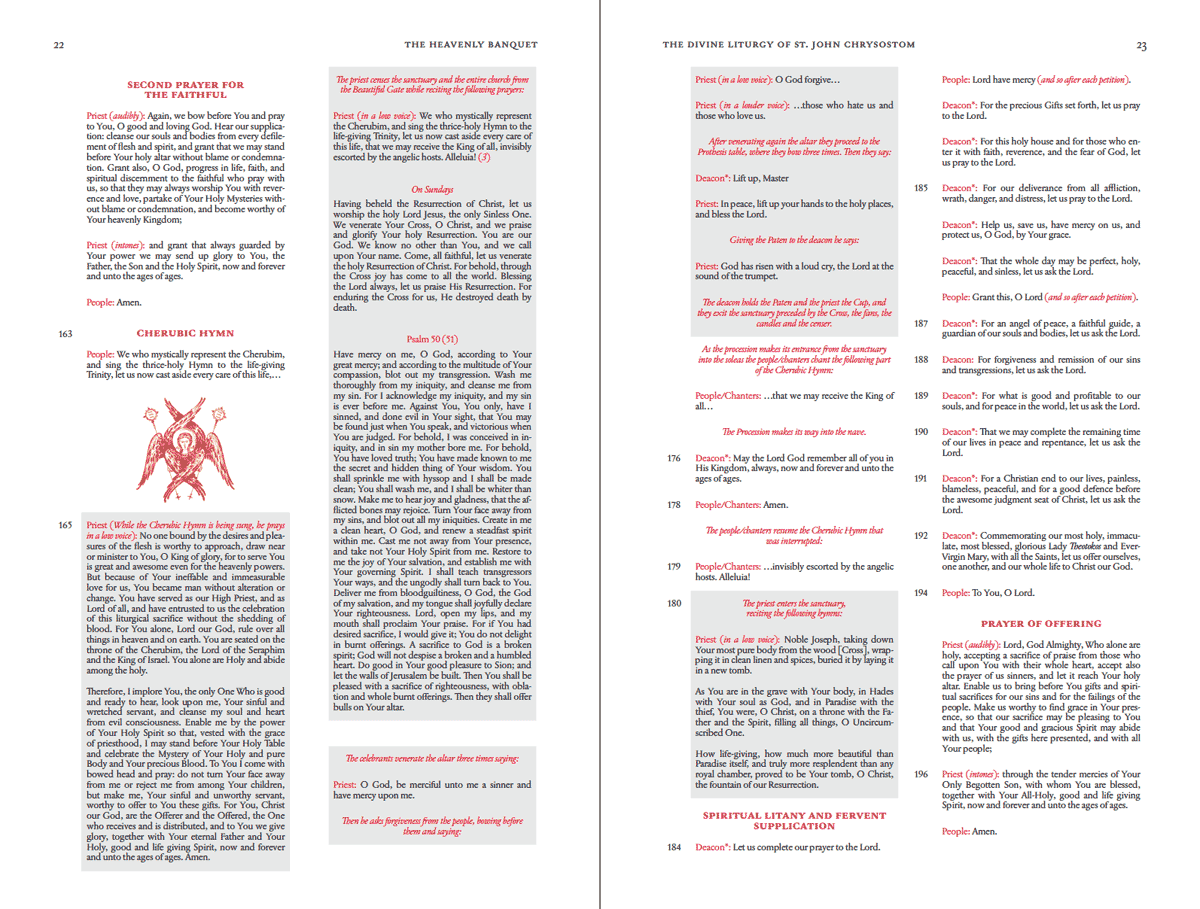
Another factor that motivated me was what I perceived a need to offer a contemporary commentary, which would provide direct and responsible answers to current questions. The ancient commentaries, like those by St. Germanos, St. Maximos, St. Symeon of Thessalonica, and especially St. Nicholas Cavasilas, are very valuable, but difficult to navigate through and are heavy in symbolism and mysticism. We mention such interpretations, but generally we stick to an approach we call “realistic,” because the words and actions are commented based on the textual and historical witness. We also tried to address current issues. Other commentaries are scholarly, contained in specialized books and articles, like those by Robert Taft, Fr. Schmemann, Fr. Calivas and others.
The language we use is simple, to make it accessible to everyone.
Fr. C: Could you share with our listeners a sample of what readers will find?
Fr. E: The bulk of the text consists in a line-by-line commentary of the entire Divine Liturgy of St. John Chrysostom. Interspersed are 80 special studies dealing with important issues and expanding on the words and actions of the Divine Liturgy. Many of the notes are valuable, containing important information.
The full text of the Divine Liturgy of St. John Chrysostom is provided. A nice feature about it is that next to each petition and prayer there is a number that refers to the page number where the topic is addressed.
In the extensive Introduction we state concisely what the purpose of the Divine Liturgy is: to unite us with the Theanthropos Christ and to transform our lives. It answers the question, What is the Divine Eucharist, in eight different ways. It is
- The real presence of God
- A memorial of His love
- Our thanksgiving to God the Father
- A memorial of the Mystical Supper
- A commemoration of the Lord’s sacrifice on the cross
- Communion by the faithful of the Body and Blood of our Savior
- A continuous Pentecost and
- A foretaste of the Banquet of the Kingdom
It explains that the Divine Eucharist is a meal, even a Heavenly Banquet, it goes over its symbolism and mysticism, it points to its resurrectional and celebratory character, and accentuates its participatory character as well, which constitutes one of the main aims of the book.
Fr. C: One of my favorite elements in the book is the Mini Studies. Can you tell our listeners about them and maybe give a few examples?
Fr. E: The Heavenly Banquet provides answers to a multiplicity of questions. Why do we pray “for our armed forces”? The question leads to a brief examination on the issue of war. The petition, “for favorable weather” leads to an exploration of the issue of God’s involvement in the world; the petition for those “departed from this life before us” leads to a study on the souls; and praying for health leads to a study on miracles. Many other issues are addressed in a similar fashion, including suffering, grace, intercession and veneration of saints, inspiration, judgment, open communion, significance of dogma, and so on.
I would like to single out our proposed version for The Lord’s Prayer (p. 307). The established version (based on the Episcopal Book of Common Prayers) is full of errors and therefore unacceptable. Yet it was recently advanced by the Archdiocese as its “official” version. We believe that our brief commentary (5 ½ pages) on the Lord’s Prayer is of value to anyone.
Fr. C: Now, you also address a few sensitive topics. Would you talk a little about that?
Fr. E: Certain touchy topics need to be addressed. The commentary does not balk at addressing difficult and controversial issues: Here is a sampling: Is there grace outside the Church? What about ecumenism? Should we have “open communion” with non-Orthodox Christians? Why do we insist on dogma? What is the relationship of faith and science? Some of our proposed “solutions” may not be agreeable to all (pp. 266-268).
A few sensitive subjects are contained in various notes and studies, like that on the Church (p. 211) and the Unity of faith (p. 302), the reception of converts (p. 153), the “one baptism” given in the One Church (commented upon in the Creed, note 652, p. 211), the subject of liturgical translations (p. 213), the commemoration of the bishop (note 989, p. 293) and the comments on their attire (note 364, pp. 129-131—there is a note probably bishops would not like), etc.
Fr. C: What are the main objectives of your commentary?
Fr. E: The commentary returns to a few points with persistence. Active and joyous participation by the people stands out—participation through a fuller comprehension, by joining in the singing (called a right and a privilege of the people), by praying and, especially, through participation in the holy mysteries.
The commentary insists that the so-called secret prayers be read out loud (nothing is kept secret from the people of God).
Fr. C: Who did you write this book for? What's your target audience and what do you hope they'll take away with them from the book?
Fr. E: My target audience is anyone who reads books! Admittedly, this is a limited target these days… Originally the book was conceived for the “average” reader. I had to revise it to the “inquisitive” or “inquiring” reader.
Fr. C: I wonder if this might not be a wonderful introduction to the Liturgy for seekers or visitors to Orthodox churches so they could understand all the symbolism. I mean, you really use easy to understand, modern language to explain these very complex ideas. For example: “it takes guts to raise our eyes and address God.”)
Fr. E: I think converts and catechumens would devour it. It is ideal for study groups.
Fr. C: Do you have anything else to say about your book?
Fr. E: We think that by studying The Heavenly Banquet the Divine Liturgy won’t be boring ever again. This book helps one to pray with understanding, with meaning, with fervor, and with spiritual joy.
I would like to say two words about the publisher, Orthodox Witness. We are an outreach organization founded in 2002. We published this book ourselves, with the assistance of my son, Tony, a professional multimedia specialist and book editor. Perhaps another time, Fr. Chris, you will invite me to share with your audience our organization’s mission, goals and vision.
Fr. C: Are there any other projects or books in the works you'd like to tell us about?
Fr. E: Yes, thank you. Before I do that, allow me to first thank Archbishop Nathaniel for his eloquent and generous Foreword to the book. I’m heavily indebted to him.
I would also like to mention that our organization, Orthodox Witness, has three more books out: the lives of two contemporary holy men, Elder (now Saint) Iakovos of Evia (called The Garden of the Holy Spirit) and Papa Dimitri Gagastathis, The Man of God, and a small treatise by St. Theophan the Recluse, called Preaching Another Christ: An Orthodox View of Evangelicalism. All three have been translated by Prof. Dimitri Kagaris of our group.
As for future works, I’m presently working on a dogmatic treatise on the human nature of Christ. [Now available: Jesus: Fallen? The Human Nature of Christ Examined from an Eastern Orthodox Perspective –ed.] Years ago I became aware that Orthodox clergy and professors have deviated from the solid tradition of the Church, presenting Christ as having a fallen human nature. The study rebuts this idea as a dangerous heresy. Since this topic is debated by Roman Catholics, Protestants and Adventists, I’m addressing the book to all Christians.
I would also like to publish a comprehensive and practical Guide to Orthodoxy, geared to Protestants. I’m already over 300 pages into it.
Another study presents the Faith out of the early patristic documents, called Our Christian Roots. [a class developed and presented by Fr. E.H., forthcoming online –ed.]
I would also like to complete the music of a Divine Liturgy for youth. It is a liturgy in plain English, with rhythm and melody our young people need. I hope they would love it. Presently they have very little. I would like to find a youth choir to perform it and make a recording. I have also composed a number of Orthodox songs and hymns for children, enough for two CDs. If a choir director is listening he or she can contact me by email, fremmanuel@orthodoxwitness.org.
I’ve also written a few Christmas Plays, which I would like to publish [They have been published and are available as free downloads –ed.]. There are other projects I would like to complete, if the Lord wills and gives me time, strength and good health to do them in my retirement. Perhaps that’s asking a lot.
Fr. C: I wish every success for this worthy book, which I highly recommend, and for all your endeavors.
Fr. E: Thank you, Fr. Chris, very much for putting me on the air.
